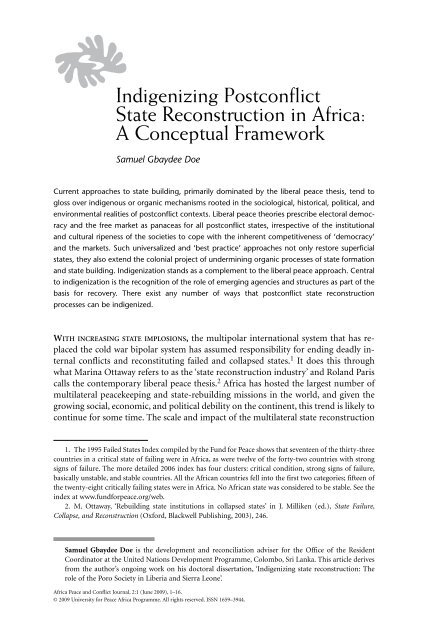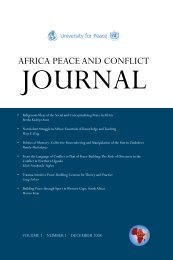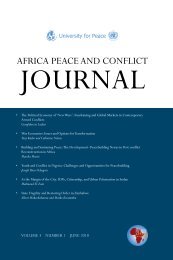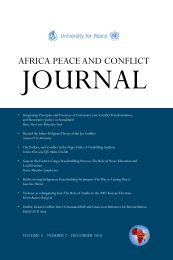Download - Africa Peace and Conflict Journal - The University for ...
Download - Africa Peace and Conflict Journal - The University for ...
Download - Africa Peace and Conflict Journal - The University for ...
You also want an ePaper? Increase the reach of your titles
YUMPU automatically turns print PDFs into web optimized ePapers that Google loves.
Indigenizing PostconflictState Reconstruction in <strong>Africa</strong>:A Conceptual FrameworkSamuel Gbaydee DoeCurrent approaches to state building, primarily dominated by the liberal peace thesis, tend togloss over indigenous or organic mechanisms rooted in the sociological, historical, political, <strong>and</strong>environmental realities of postconflict contexts. Liberal peace theories prescribe electoral democracy<strong>and</strong> the free market as panaceas <strong>for</strong> all postconflict states, irrespective of the institutional<strong>and</strong> cultural ripeness of the societies to cope with the inherent competitiveness of ‘democracy’<strong>and</strong> the markets. Such universalized <strong>and</strong> ‘best practice’ approaches not only restore superficialstates, they also extend the colonial project of undermining organic processes of state <strong>for</strong>mation<strong>and</strong> state building. Indigenization st<strong>and</strong>s as a complement to the liberal peace approach. Centralto indigenization is the recognition of the role of emerging agencies <strong>and</strong> structures as part of thebasis <strong>for</strong> recovery. <strong>The</strong>re exist any number of ways that postconflict state reconstructionprocesses can be indigenized.WITH INCREASING STATE IMPLOSIONS, the multipolar international system that has replacedthe cold war bipolar system has assumed responsibility <strong>for</strong> ending deadly internalconflicts <strong>and</strong> reconstituting failed <strong>and</strong> collapsed states. 1 It does this throughwhat Marina Ottaway refers to as the ‘state reconstruction industry’ <strong>and</strong> Rol<strong>and</strong> Pariscalls the contemporary liberal peace thesis. 2 <strong>Africa</strong> has hosted the largest number ofmultilateral peacekeeping <strong>and</strong> state-rebuilding missions in the world, <strong>and</strong> given thegrowing social, economic, <strong>and</strong> political debility on the continent, this trend is likely tocontinue <strong>for</strong> some time. <strong>The</strong> scale <strong>and</strong> impact of the multilateral state reconstruction1. <strong>The</strong> 1995 Failed States Index compiled by the Fund <strong>for</strong> <strong>Peace</strong> shows that seventeen of the thirty-threecountries in a critical state of failing were in <strong>Africa</strong>, as were twelve of the <strong>for</strong>ty-two countries with strongsigns of failure. <strong>The</strong> more detailed 2006 index has four clusters: critical condition, strong signs of failure,basically unstable, <strong>and</strong> stable countries. All the <strong>Africa</strong>n countries fell into the first two categories; fifteen ofthe twenty-eight critically failing states were in <strong>Africa</strong>. No <strong>Africa</strong>n state was considered to be stable. See theindex at www.fund<strong>for</strong>peace.org/web.2. M. Ottaway, ‘Rebuilding state institutions in collapsed states’ in J. Milliken (ed.), State Failure,Collapse, <strong>and</strong> Reconstruction (Ox<strong>for</strong>d, Blackwell Publishing, 2003), 246.Samuel Gbaydee Doe is the development <strong>and</strong> reconciliation adviser <strong>for</strong> the Office of the ResidentCoordinator at the United Nations Development Programme, Colombo, Sri Lanka. This article derivesfrom the author’s ongoing work on his doctoral dissertation, ‘Indigenizing state reconstruction: <strong>The</strong>role of the Poro Society in Liberia <strong>and</strong> Sierra Leone’.<strong>Africa</strong> <strong>Peace</strong> <strong>and</strong> <strong>Conflict</strong> <strong>Journal</strong>, 2:1 (June 2009), 1–16.© 2009 <strong>University</strong> <strong>for</strong> <strong>Peace</strong> <strong>Africa</strong> Programme. All rights reserved. ISSN 1659–3944.






